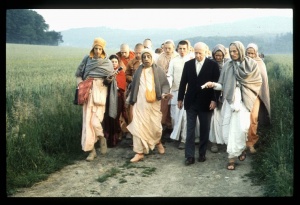CC Antya 6.237 (1975)

A.C. Bhaktivedanta Swami Prabhupada
Below is the 1996 edition text, ready to be substituted with the 1975 one using the compile form.
TEXT 237
- amānī mānada hañā kṛṣṇa-nāma sadā la’be
- vraje rādhā-kṛṣṇa-sevā mānase karibe
SYNONYMS
amānī—not expecting any respect; māna-da—offering respect to others; hañā—becoming; kṛṣṇa-nāma—the holy name of the Lord; sadā—always; la’be—you should chant; vraje—in Vṛndāvana; rādhā-kṛṣṇa-sevā—service to Rādhā and Kṛṣṇa; mānase—within the mind; karibe—you should do.
TRANSLATION
“Do not expect honor, but offer all respect to others. Always chant the holy name of Lord Kṛṣṇa, and within your mind render service to Rādhā and Kṛṣṇa in Vṛndāvana.
PURPORT
Śrīla Bhaktivinoda Ṭhākura says in his Amṛta-pravāha-bhāṣya that when a man and woman are married, they beget children and are thus entangled in family life. Talk concerning such family life is called grāmya-kathā. A person in the renounced order never indulges in either hearing or talking about such subjects. He should not eat palatable dishes, since that is unfit for a person in the renounced order. He should show all respect to others, but should not expect respect for himself. In this way, one should chant the holy name of the Lord and think of how to serve Rādhā and Kṛṣṇa in Vṛndāvana.